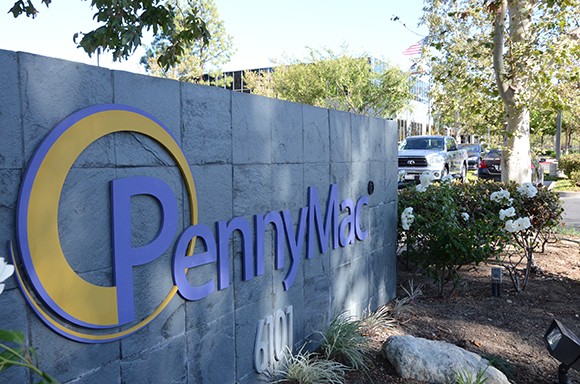PennyMac’s quarter to remember
IN THIS ARTICLE
- Banking & Finance Topic
- pacbiztimes Author
By pacbiztimes Thursday, August 6th, 2020
With mortgage rates at record lows and the homebuying and refinancing markets booming, PennyMac Financial Services, a Westlake Village mortgage lender, and its real estate investment trust both reported strong financial results on Aug. 6.

PennyMac Financial Services announced a net income of $352.7 million for the second quarter of 2020, or $4.39 per share, on a revenue of $821.6 million, and declared a second quarter cash dividend.
Its pretax income was $480.4 million, up 382 percent year-over-year. The rise was created by record earnings from core production and servicing results, which were slightly dimmed by fair value losses on mortgage servicing rights.
In June, PennyMac Financial Services also repurchased about 7 million shared of its common stock—approximately 9 percent of total outstanding shares—from The BlackRock Foundation for about $237.2 million, at $34 per share.
Other areas of PennyMac’s business also fared extremely well. The company saw a record production segment pretax income of $538.1 million, up 448 percent from the second quarter of 2019. The company said the increase is from record volumes in the direct lending channels and record margins across all channels. Direct lending interest rate lock commitments also hit a record in the second quarter at $13 billion in unpaid principal balance, up 177 percent from the second quarter of 2019.
The company hired more than 1,000 new employees during the quarter to help it address the planned, long-term growth of its direct lending platforms and help borrowers with hardships. PennyMac put $25.8 million towards credit losses on active loans related to COVID-19.
“I am proud of the role this company continues to play in the economic recovery and while prospects for the U.S. economy remain uncertain, given the present market environment, we expect PFSI’s exceptional financial performance to persist into 2021,” PennyMac President and CEO David Spector said in the company’s earnings release.
PennyMac Mortgage Investment Trust, a real estate investment trust that invests in mortgage-related assets, also released its earnings report on Aug. 6. The company saw its stock shoot up after it reported a net income of $458.4 million, or $4.51 per common share, on a net investment income of $558.3.
It’s a completely different place than the company was in the second quarter of 2019, when PennyMac Mortgage Investment Trust recorded a $38 million net income, about $0.50 per common share, on a net investment income of $96.4 million.
The firm attributed the latest quarter’s rise in net income to what it called record Correspondent Production segment results, as well as a partial recovery in the fair value of government-sponsored enterprise credit risk transfer investments.
Gains were slightly offset by fair value losses on mortgage servicing rights because of higher than expected prepayments during the quarter, as well as anticipated continued higher prepayments in the future, generated by lower rates.
The company also made significant investments elsewhere. Conventional correspondent loan production came to a total of $18.9 billion in unpaid principal balance, up 76 percent from the same time in 2019. Additionally, PennyMac Mortgage Investment Trust added $203 million of new MSR investments, and credit risk transfer deliveries brought in $1.8 billion in unpaid principal balance, which yielded a strong commitment to buy $48 million in new CRT securities.
PennyMac also repurchased about 566,000 common shares of PMT at a weighted average price of $13.36, to a tune of $7.6 million.
“PMT delivered record earnings in the second quarter, rebounding from the significant first quarter loss, which drove a substantial recovery in book value from the prior quarter,” Spector said. “As a result of our manager’s commitment to risk management and operational discipline, PMT not only protected the value of its assets in a volatile year-to-date period, but was able to continually acquire, fund and settle loans throughout the crisis as others retreated.”











